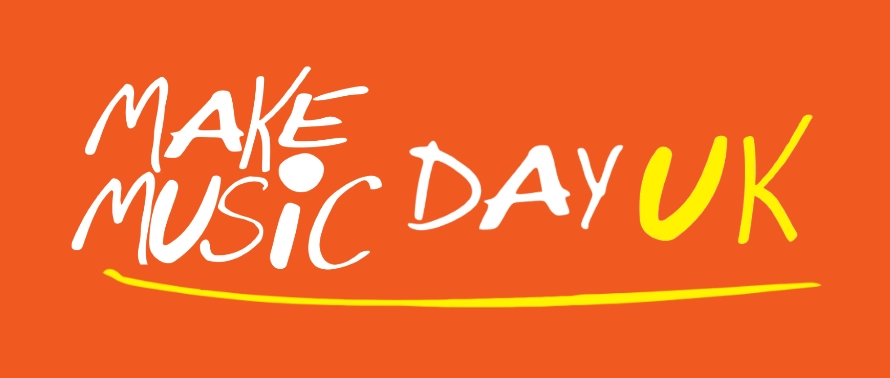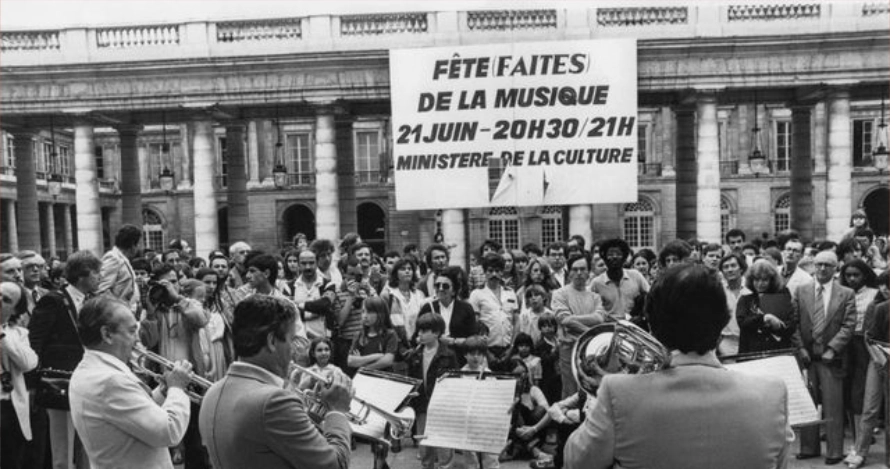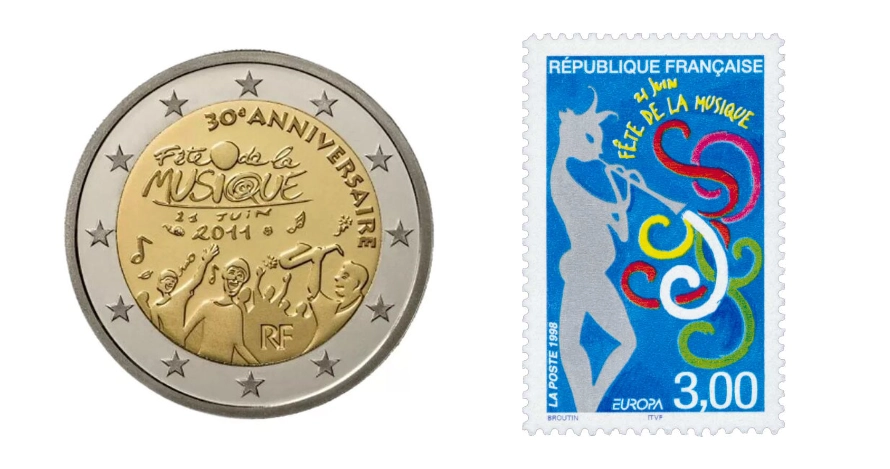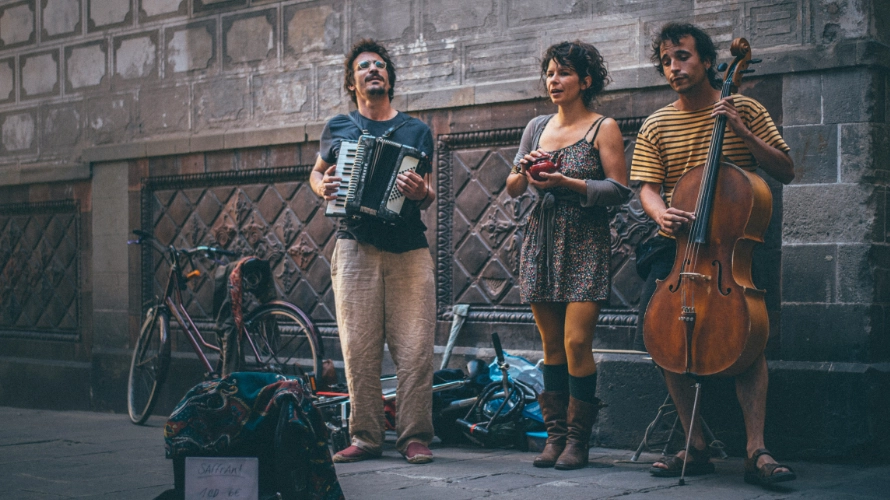Fête de la Musique, a celebration for everyone
The Fête de la Musique, that amazing French celebration of sound and community, is nearly here again! If you find yourself in France on the evening of June 21st, you’re in for a treat. Streets, squares, cafés, and even parks burst to life with music, every genre imaginable, from jazz and rock to classical and rap, and all manner of styles in between. It’s a night when the entire country becomes a stage, and anyone with an instrument or a voice is welcome to take part, amateur or professional, young or old. Best of all, every performance is free, and everyone is invited to listen, dance, or even join in wherever the mood takes them.
Also in the UK: Make Music Day
While the Fête de la Musique is a distinctly French tradition, its spirit has spread far beyond France’s borders, including across the Channel to the UK. Here, the annual celebration is known as Make Music Day (formerly National Music Day, National Music Festival, and Music Day UK), and it shares the same vision of bringing music to everyone, everywhere.

The idea was first launched in the UK in 1992, thanks to musician Mick Jagger and then-Minister of State for the Arts, Tim Renton. The initial events were big, ambitious affairs, with thousands of performances across the country and support from major broadcasters and organisations. Over the years, the format and name have evolved, but the core principle has remained: to celebrate music freely and openly on June 21st.
After a period of quieter activity, the event was revived in 2012 and has since grown into an independent, nationwide celebration. Today, Make Music Day UK is part of a global movement inspired by the original French Fête de la Musique, with free, accessible performances in towns and cities up and down the country.
While the UK version may not have the same level of public visibility as the French original, it has inspired a range of enduring local festivals and events. The legacy of Make Music Day lives on in community gatherings and grassroots initiatives, keeping the spirit of open, inclusive music-making alive in British culture

The story behind the celebration
The Fête de la Musique was born in 1982, thanks to Jack Lang, then France’s Minister of Culture, and Maurice Fleuret, a music journalist and administrator. Their vision was simple: make music accessible to everyone, regardless of age, background, or ability. They chose the summer solstice, the longest day of the year, because it’s a time when people naturally want to be outdoors, enjoying the warmth and light.
The event’s slogan, “Faites de la musique” (meaning make music as well as celebration of music), encourages everyone to make music, not just listen to it. From the very first year, the idea caught on. Musicians of all kinds, amateurs, professionals, young, old, took to the streets, parks, cafés, and public squares. The result was an explosion of sound and energy that has since spread across the globe, with over 120 countries now hosting their own versions. But nowhere is it quite as vibrant as in France.
A phenomenon that went global
The Fête de la Musique began to cross borders just a few years after its launch. In 1985, during the European Year of Music, the celebration started to spread beyond France. By 1997, a “Charter of Partners of the European Music Festival” was signed in Budapest by major cities such as Paris, Berlin, Budapest, Barcelona, Istanbul, Liverpool, Luxembourg, Rome, Naples, and Prague, formalising its European reach.
The festival quickly became a social phenomenon. So much so that in 1998, it was commemorated on a postage stamp alongside the Olympic Games and the Queen of England, a mark of its cultural significance. And the recognition didn’t stop there, on the 30th anniversary in 2011, France issued a special 2 euro coin celebrating the Fête de la Musique, featuring joyful musicians and musical notes, further cementing the event’s place in national heritage.

Today, the Fête de la Musique has far outgrown Europe’s borders. It’s celebrated in over 120 countries across all five continents, from New York to Tokyo, Cape Town to Buenos Aires. While each country brings its own flavour to the event, the spirit of free, inclusive music-making remains the same. The French original still holds pride of place as the largest and most vibrant celebration of its kind.
What makes it unique
The Fête de la Musique stands out from other music festivals for its inclusivity and spontaneity. Anyone can play, anywhere, as long as the performance is free. You might hear a classical quartet in a church, a jazz trio in a café, a rock band in a park, or a group of friends with guitars on a street corner. The only rule is that music should be shared, not sold.
This openness creates a relaxed, joyful atmosphere. You don’t need a ticket, a plan, or even to be a music expert. Just step outside and follow your ears. One moment you might be listening to a choir singing traditional Breton songs, the next you’re dancing to salsa in a park or catching a DJ set in a courtyard. The night belongs to everyone, families, teenagers, couples, and solo explorers. In cities like Paris, Lyon, Marseille, Bordeaux, and Toulouse, the streets are packed with people moving from one performance to the next. Even in small villages, the mood is lively and welcoming.
The Fête de la Musique is a chance to discover new styles and cultures. France’s multicultural cities mean you can experience African drumming, Middle Eastern melodies, Latin American rhythms, and much more, all in a single evening. It’s a night when the usual boundaries between genres and backgrounds blur, and everyone is united by the love of music.

How the frogs celebrate
The French approach the Fête de la Musique with enthusiasm and a sense of community. Bars and cafés stay open late, serving drinks and snacks to the crowds. Restaurants often feature live music, and some offer special menus for the occasion. Families, groups of friends, and even solo wanderers fill the streets, creating a friendly, social atmosphere.
In big cities, the energy is electric, with thousands of performances happening simultaneously. In smaller towns, the vibe is more intimate but no less spirited. Wherever you are, you’ll see people of all ages chatting, dancing, and sharing stories. It’s a night when the usual social barriers disappear, and everyone feels part of something bigger.
Why the Fête de la Musique matters
At its core, the Fête de la Musique is about connection. In a world often divided by differences, it’s a rare occasion when people come together simply to enjoy something they love. Music becomes a universal language, breaking down barriers and creating a sense of belonging.
It’s also a reminder of the value of public spaces and live experiences. In an age of streaming and virtual entertainment, the Fête de la Musique brings people out of their homes and into the streets, encouraging real, shared moments.
For visitors, it’s a chance to see France at its most open and joyful. For locals, it’s a cherished tradition, a night when the whole country celebrates what unites us.
Final thoughts
The Fête de la Musique is a great national party, a night of surprises, and a celebration of music’s power to bring people together. Whether you’re a musician or a listener, a local or a visitor, it’s an experience you won’t forget.
So, if you find yourself in France on June 21st, don’t stay indoors. Step outside, follow the music, and join the celebration!

